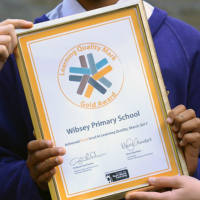We couldn’t let the term end without celebrating Wibsey primary school’s achievement, that of reaching Gold level of the Learning Quality award.
Inspired by the story of Miriam Lord Primary, another Bradford school, Nigel Cooper – Headteacher at Wibsey Primary School – started his staff and pupils on building their learning power just three years ago. In March this year they were assessed against the Learning Quality Framework and were awarded Gold Level accreditation. The assessment report offers a clear insight into the characteristics of a school that has really got stuck into learning power and making a difference with it.
As you would expect Wibsey school has a clear vision for what it is trying to achieve and this is unambiguously nurtured by the senior team. This feature of committed leadership has led to two standout features:
- An inclusive Community of Learners
- A refined language for learning

An inclusive Community of Learners
‘Community of learners’ is an oft trotted out phrase, often with little substance. But for Wibsey it is considered as ‘our spine’ because it runs through everything they do. This community of learners involves everyone; leaders including governors, staff, pupils and parents.
Learning power is a recurring theme at governors meetings and they have come to realise that this, sometimes hard to understand approach, has been of real benefit for the school.
Parents are drawn into the process through a handbook designed to help them support their children at home, through Skills Afternoons where they can see learning power in action,and through pupil reports which give clear indications of the precise behaviours their children are using in lessons. Furthermore parents are helped by the children themselves who, to their parents’ amazement, come home and talk about their learning process.
There is a real culture of experimentation and risk taking which everyone recognises as important in ensuring the evolution of learning power across the school. The focus of monitoring classroom practice has moved from a top down monitorial model to a developmental approach that supports teachers to identify and address their own development needs. Staff learn by sharing experiences and ideas and have plenty of opportunities to observe each other. They set themselves learning targets just as pupils do.
Most importantly, responsibility for learning has been placed securely with the learner, where coaching rather than telling is the preferred way of working. Hence the distinction teacher and learner is becoming more blurred as teachers learn alongside their pupils. Having taken on their responsibility for learning pupils have gained a positive view of themselves as learners and as their understanding of learning behaviours grows they are more able to take control of their improvement trajectory. They are reflective about themselves as learners and are able to describe how they are growing as effective learners.
In the words of headteacher Nigel Cooper: “Building Learning Power has enabled the whole school to change dramatically. Whereas, previously, our pupils were more “spoon fed” they have now become learners who can think and learn for themselves, and reflect on their own learning. The staff have also benefited from BLP. For example, they work more collaboratively within the classroom and with each other. Parents have also been involved in gaining an understanding of BLP and this has helped them support their children with their school work.”
A refined language for learning
It is the strength of practice in relation to the progression in learning behaviours, and how this has back-washed into the curriculum and all aspects of the school culture, that sets Wibsey apart from many other schools. Unsurprisingly, curriculum progress is strong as evidenced by Raise Online and by ongoing monitoring data.
The school has paid particular attention to how it will ensure progression in the acquisition of learning habits and teachers actively pursue this through discussion as pupils move through the school. Most practitioners and pupils are well-versed in the school’s language for learning as defined in the school’s learning behaviour Progression Map ( i.e. how the behaviours become more skilled and sophisticated) and use it in discussion about learning to draw attention to existing effective behaviours and to encourage pupils to adopt / develop others.
Pupils are familiar with the school’s map of progression and use it the better to understand how they learn and what more they can/should do. As a result older pupils are well aware that their lessons help them to both acquire content and exercise / stretch their learning behaviours and that their growth as a learner is linked to and enhances their subject progress and attainment.
The school has a variety of formative methods of assessing, recording and reporting progression in learning habits linked to their detailed map of progression. Middle leaders refer to this map as ‘the holy grail’. The map is being interpreted for children primarily through the use of progression ‘ladders’ which are evident in everyday classroom practice.
More importantly, interviews revealed pupils’ deep understanding of these finer-grained learning behaviours which is leading to a focus on stretching, rather than simply using them. Conversations with pupils uncovered: how an individual was improving as a collaborative learner and what being a highly effective collaborator does; how a year 5 pupil who used to think ‘when it’s done it’s done’ has realised that by using a range of revising skills she is able to further improve on her first attempts; how blends of a range of behaviours help pupils to solve problems in mathematics. None of this would have been possible if pupils did not have a detailed understanding of learning behaviours and how they improve.
Put simply, the school has worked on and embedded the ‘Building‘ aspect of Building Learning Power and it is this aspect of the approach that’s made the difference.
But what about results? The school feels that in the last three years, BLP has made a significant difference to Key Stage 2:
- Key Stage 2 pupils reaching the expected standard across Reading, Writing and Maths in 2016 was above the national result by 8%. In previous years this figure had been in line with the national figure.
- In Maths attainment was 9% above the national average and in Grammar, Punctuation and Spelling attainment was 16% above the national figure.
BLP has also raised the attainment of the younger pupils. At the end of Key Stage 1, the school’s attainment results had previously been in line with the national figures; but in 2017, the attainment in Reading was 7% above the national, 11% above in Writing, and 6% above in Maths. These results are all the more satisfying as they come in the face of the higher demands of the new National Curriculum.
We would like to take this opportunity to congratulate the staff and pupils of Wibsey on their achievement! They have already received significant coverage in their regional newspaper and this has been picked up by Asian Image, a satellite newspaper belonging to the Telegraph & Argus in Bradford. At the beginning of July the school welcomed visitors from Australia who wanted to know what the best of Learning Power looks like. The school is an outstanding example of how to adopt a consistent and forensic approach to building better learners. That this has been achieved in under three years is remarkable.
If you feel your school would benefit from taking a deeper look at BLP and getting to grips with the progression of learning habits, take a look at some of our online learning courses:
or contact us for further support.
If you read this and thought “Yes, this is what my school already feels like!” you could be ready for a Learning Quality Framework assessment and award. Take a look here for more information.


No comments yet.